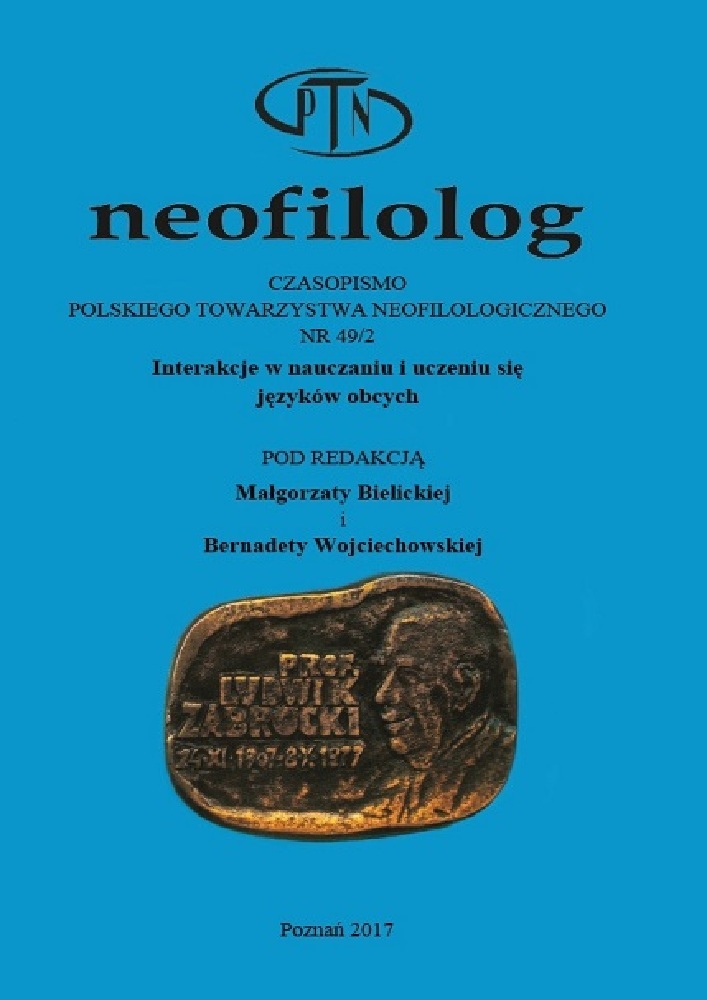Résumé
The article discusses the problem of language anxiety in foreign language learning. The author presents definitions and typologies anxiety,
the biological symptoms of anxiety and their interpretation. A research study, conducted on a group of students of Applied Linguistics is described. The investigation included if they are afraid of speaking in German classes and during the exam, or if they are afraid of their German teacher. The results of the study show that communication apprehension, test anxiety, social anxiety, final grades, attitude to the teacher, and self-assessment are some of the reasons for language anxiety in the foreign language learning process.
Références
Braun, M. 2012. Gry codzienne i pozacodzienne. O komunikacyjnych aspektach aktorstwa. Kraków: UNIVERSITAS.
Byra, S. i M. Parachimiuk. 2009. Osobowościowe i społeczne uwarunkowania radzenia sobie ze stresem przez studentów pierwszego roku. Lublin: Wydawnictwo Uniwersytetu Marii Curie-Skłodowskiej.
Catanzaro, D. A. de. 1999. Motywacje i emocje. W ujęciu ewolucyjnym, fizjologicznym, rozwojowym i społecznym. (tłum. A. Wojciechowski). Poznań: Wydawnictwo Zysk i S-ka.
Darwin, C. 1955 (I wyd. 1872). The expression of the emotions in man and animals. New York: Philosophical Library.
Figarski, W. 2003. Proces glottodydaktyczny w szkole. Warszawa: Wydawnictwo Uniwersytetu Warszawskiego.
Horwitz, E. K. 1986. „Preliminary evidence for the reliability and validity of a foreign language anxiety scale”. TESOL Quarterly, 20, str. 559-562.
Juroszek, W. 2010. Autoprezentacja młodzieży szkolnej. Emocjonalne i poznawcze konsekwencje deprecjonującej i faworyzującej autoprezentacji u młodzieży z wysokim i niskim lękiem społecznym. Kraków: Impuls.
Kępiński, A. 1977. Lęk. Warszawa: Państwowy Zakład Wydawnictw Lekarskich.
Komorowska, H. i D. Obidniak. 2002. Stopień po stopniu. Rozwój zawodowy nauczyciela języków obcych. Warszawa: Wydawnictwo Naukowe PWN.
Leary, M. i R. M. Kowalski. 2001. Lęk społeczny. (tłum. E. Zaremba). Gdańsk: Gdańskie Wydawnictwo Psychologiczne.
Ledwoch, M. 1993. „Obraz siebie w sytuacji przeżywanego lęku”. (w) Lęk. Różnorodność przeżywania. (red. W. Tłokiński). Warszawa: ARX REGIA, str. 28-34.
Leeuw de, H. 1995. „Über die Angst beim Fremdsprachenlernen in der Grundschule”. (w) Didaktik des Fremdsprachenlernens. (red. L. Bredella i H. Christ). Tübingen: Gunter Narr Verlag, str. 170-185.
Libiszowska-Żółtkowska, M. 2007. „Wprowadzenie”. (w) Czego obawiają się ludzie? Współczesne zagrożenia społeczne – diagnoza i przeciwdziałanie. (red. M. Libiszowska-Żółtkowska). Warszawa: Wydawnictwo Uniwersytetu Warszawskiego, str. 9-20.
MacIntyre, P. D. 1999. „Language anxiety: A view of the research for language teachers”. (w) Affect in foreign language and second language learning. A practical guide to creating a low-anxiety classroom atmosphere. (red. D. J. Young). Boston: McGraw-Hill, str. 24-45.
Piechurska-Kuciel, E. 2008. Language anxiety in second grammar school students. Opole: Wydawnictwo Uniwersytetu Opolskiego.
Piechurska-Kuciel, E. 2011. „Trudności w rozwijaniu sprawności interakcyjnych – rola lęku językowego”. (w) Nauka języka obcego w perspektywie ucznia (red. H. Komorowska). Warszawa: Oficyna Wydawnicza Łośgraf, str. 239-258.
Płużek, Z. 1993. „Lęk charakterologiczny”. (w) Lęk. Różnorodność przeżywania. (red. W. Tłokiński). Warszawa: ARX REGIA, str. 35-48.
Smółka, P. 2007. „Lęk społeczny i nieśmiałość”. (w) Czego obawiają się ludzie? Współczesne zagrożenia społeczne – diagnoza i przeciwdziałanie. (red. M. LibiszowskaŻółtkowska). Warszawa: Wydawnictwo Uniwersytetu Warszawskiego, str. 9-20.
Steiner, G. i J. Hermann. 2007a. „Angst vor weißen Kitteln – Klassisches Konditionieren”. (w) Lernen. 20 Szenarien aus dem Alltag. (red. G. Steiner). Bern: Verlag Hans Huber, str. 15-27.
Steiner, G. i J. Hermann. 2007b. „Keine Angst vor Examen! – mehr als nur Desensibilisierung”. (w) Lernen. 20 Szenarien aus dem Alltag. (red. G. Steiner). Bern: Verlag Hans Huber, str. 124-141.
Stölting, W. 1987. „Affektive Faktoren im Fremdsprachenerwerb”. (w) Gesteuerter Zweitspracherwerb. Voraussetzungen und Konsequenzen für den Unterricht. (red. E. Apeltauer). München: HueberVerlag, str. 99-110.
Tłokiński, W. 1993. „Determinanty społeczne, poznawcze i somatyczne w mechanizmie lęku komunikacyjnego”. (w) Lęk. Różnorodność przeżywania. (red. W. Tłokiński). Warszawa: ARX REGIA, str. 99-110.
Licence
© Izabela Bawej 2017

Ce travail est disponible sous licence Creative Commons Attribution - Pas de Modification 4.0 International.
Auteurs :
Les auteurs de textes acceptés pour publication dans la revue Neofilolog sont tenus de remplir, signer et renvoyer à l'adresse de la rédaction, un accord sur l'octroi d'une licence gratuite pour les œuvres, avec obligation d'accorder une sous-licence CC.
En vertu de cet accord, les auteurs des textes publiés dans la revue Neofilolog accordent à l'Université Adam Mickiewicz de Poznań une licence non exclusive et gratuite et permettent l'utilisation de la sous-licence Creative Commons Attribution-NoDerivatives 4.0 International (CC BY-ND 4.0).
Les auteurs se réservent le droit de disposer librement de l'œuvre.
Utilisateurs :
Les utilisateurs d'Internet intéressés ont le droit d'utiliser les œuvres publiées à partir de l'année 2017 sous réserve des conditions suivantes :
- reconnaissance de la qualité d'auteur - l'obligation de fournir des informations sur la qualité d'auteur, le titre, la source (liens vers l'œuvre originale, DOI) et la licence, ainsi que l'œuvre distribuée ;
- sans créer d'œuvres dérivées - l'œuvre doit être conservée dans sa forme originale, p. ex. les traductions ou les interprétations ne peuvent être distribuées sans le consentement de l'auteur.
Tous les textes publiés sont soumis au droit d'auteur.
Autres :
L'Université Adam Mickiewicz de Poznań se réserve le droit à la revue dans son ensemble (mise en page, forme graphique, titre, conception de la couverture, logo, etc.).
.
